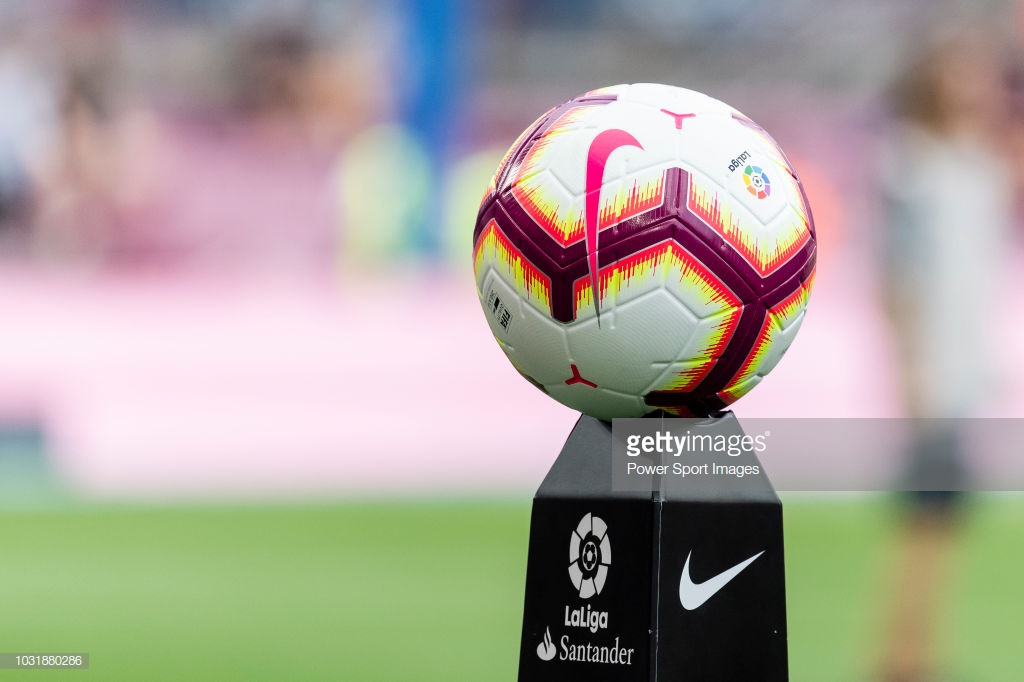Players, managers, clubs all come and go in La Liga, it is part and parcel of modern football.
However, this summer’s transfer of Cristiano Ronaldo from Real Madrid to Juventus was different. It meant a lot more to the club and also the league. Ronaldo the talent, personality and brand left Spain for ventures elsewhere, 12 months after another marketable superstar – Neymar – left Barcelona for Paris.
La Liga now faces the task of ensuring that not only the eyes of the world remain on Europe’s most technically astute league but also that it develops and progresses.
Additions such as Malcom (Barcelona), Thomas Lemar and Thibaut Courtois (both Atletico Madrid) bring hope.
There is a lot to play for this season; with or without Ronaldo, La Liga still has a plenty to offer.
One legend down but Barcelona still start as favourites
Andres Iniesta will be hugely missed at Camp Nou - and Spanish football, for both his humility and his quality. But it’s perhaps the deeper squad restructuring that is more significant.
Underperformers Yerry Mina, Lucas Digne, Andre Gomes, Gerard Deulofeu and Aleix Vidal have all been moved on as Ernesto Valverde prepares for his second season.
Some, such as Mina, did not get enough time to prove their worth but even he has been replaced with the promising Clement Lenglet from Sevilla.
But it is perhaps the signing of Arturo Vidal that is the most significant. It represents another shift towards a more direct style of play that was hinted at last season. Less possession, less pressing, less startling but more clinical.
It has been a talking point throughout the Catalan city, despite last season’s title win and coming close to remaining unbeaten, the style was questioned.
Valverde’s more practical approach is logical, the exit of Iniesta only emphasises that.
Barcelona simply do not have the extreme talent to play in the manner that Pep Guardiola preached over five years ago.
There were times last season – away in Rome being the most notable – when it was clear that La Blaugrana could be rattled; their slightly soft centre was exposed, albeit not too often.
The Champions League will be the main objective for Valverde’s side this season; whether they can manage success in Europe alongside consistency in the league is the true test of the coach’s work.
The battle for Madrid (and the league)
The post-Ronaldo era at Real Madrid begins along with a new manager also.
Julen Lopetegui will bring different ideas compared to Zinedine Zidane and is ultimately tasked with rebuilding a somewhat ageing starting XI.
New, younger players have to be integrated no matter who the coach is, but Lopetegui is most definitely better suited given his previous role as Spanish Under-21 manager.
It will be interesting to see how much 18-year-old Vinicius Junior plays. His talent is undeniable but his introduction must be measured.
More than anything else, it will be the consistency that must improve for Real to mount a title challenge. The gap was too big too early last season after early blips and slip-ups, but like their rivals Barcelona, there are questions surrounding their style and whether team functionality is too often overlooked for individual brilliance.
The door is, therefore, very much open for Atletico Madrid. They will be a force to be reckoned with this season.
Their Uefa Super Cup victory showed a balanced, gritty and talented side albeit only in a pre-season match.
There is every reason to believe that Atleti will be Barcelona’s greatest challengers this season, having finished one place behind them last season.
The attacking prowess of Antoine Griezmann – who stays at the club following ‘La Decision,' Diego Costa and Nikola Kalinic will be well supplied by newcomer Lemar, Koke and Saul in midfield.
There is a versatility that Diego Simeone has not had the luxury of during his time in charge of Los Colchoneros.
They are well-equipped and capable of taking charge of this season’s La Liga.
Party crashers
There is a hungry pack of teams behind the top three that have aspirations of crashing the party.
Naturally, Valencia are the obvious contenders having finished fourth last season and strengthening in the summer.
Michy Batshuayi is an astute addition on loan, while the signings of Kevin Gameiro and Denis Cheryshev bring alternatives to Simone Zaza and Rodrigo upfront.
However, it is the boyish enthusiasm of coach Marcelino that makes Valencia tick at the moment.
He arrived with the club in a difficult period but has managed to remove the deadwood and increase the enjoyment on the south-east coast. His fitness-based regime makes Valencia competitive in every match that they play.
Real Betis will again look to combine entertainment and achievement under maverick coach Quique Setien. They conceded the most goals out of any team that stayed up but in the second half of the season, there was a definite tightening of the defence with the addition of Marc Bartra.
Summer signings William Carvalho and Sidnei will only increase the defensive stability.
Sevilla suffered similar problems as their city rivals, conceding too many goals and losing 14 matches last season. This will be an interesting time for the team and new coach Pablo Machin – who has earned praise for his work at Girona – faces quite a tough task as the playing quality is not as high as in recent years.
Steven N’Zonzi and Joaquin Correa are noticeable losses.
Aside from being part of the greatest unveiling of a player signing ever, it will be interesting to see how Santi Cazorla’s return fits with Villarreal.
Intrigue at the bottom
In Rayo Vallecano and Real Valladolid, La Liga welcomes back some old faces. Rayo return having been down in Segunda for the past two seasons whilst Valladolid – a club with a deep top-flight heritage – return after four.
Huesca, however, are a new face to all.
The tiny club from Aragon impressed last season when winning promotion and along with the Rayo and Valladolid, their aim will be survival.
The relegation battle will not just be fought between the three promoted sides though; complacency has gripped a number of mid-table teams in recent seasons and it could possibly happen again.
Espanyol, Levante and Leganes must improve as this season’s relegation battle is likely to be much closer than that of last year.
VAR
Rather surprisingly, Video Assistant Refereeing (VAR) will be used in La Liga before the Premier League.
The decision by the English clubs to deter using the new system already looks ignorant but it will make an appearance in Spain this season, putting the system under the microscope at a top level on a regular basis.
Despite the enjoyment that Spanish football fans from the pintxos bars to the tapas bars have of running the rule over every decision on and off the pitch, there are plenty of welcoming arms.
The World Cup showed how useful a tool it can be, it’s the future and, for once, Spain are embracing in good time.










































